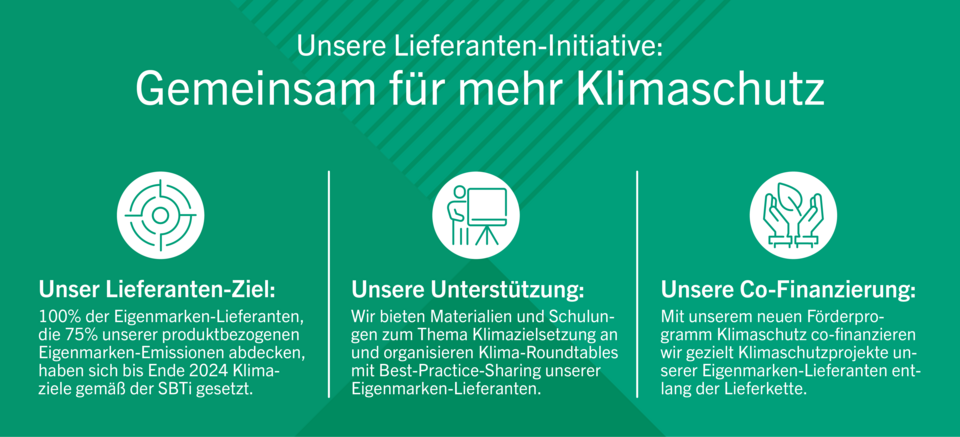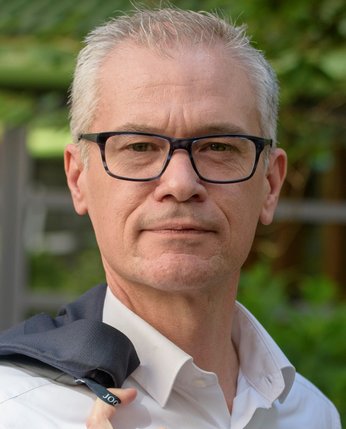
In 2021, REWE Group launched the #GemeinsamFürMehrKlimaschutz initiative to offer suppliers support in climate protection in the supply chain. In one, we provide an overview of the building blocks of the initiative, the goals and specific projects for climate protection in the supply chain. In a short interview: Dirk Heim, Head of Sustainability Goods at REWE Group, on the newly initiated climate protection support programme.
The consequences of climate change are becoming ever clearer. We want to be a pioneer in climate protection and have defined this as a focal topic of our sustainability strategy. We are specifically extending our commitment to the supply chain, as this is where the greatest leverage for more climate protection lies: with regard to REWE and PENNY Germany, emissions from the upstream supply chain account for a large proportion of total climate-relevant emissions. That is why we are committed to comprehensive measures that effectively reduce our emissions and promote innovative solutions along the entire supply chain. This can only be achieved together with our suppliers. To this end, we founded the #GemeinsamFürMehrKlimaschutz initiative in 2021. With our strategic own-brand suppliers, who account for 75 per cent of product-related own-brand emissions, we will agree specific targets for reducing greenhouse gases in the upstream supply chains by the end of 2024. The targets are to be based on the Science Based Target Initiative (SBTi), which we as REWE Group have joined.with the newly introduced climate protection support programme, we have also been promoting measures to implement the targets since this year.
SBTi - what is it?
The SBTi is an alliance of the partners CDP, UN Global Compact, World Resources Institute (WRI) and the WWF and works closely with the scientific community to develop climate targets in line with the Paris Agreement. SBTi targets are consistently geared towards drastically reducing corporate emissions. By joining the SBTi, REWE Group is committing to science-based climate targets based on the 1.5-degree pathway of the Paris Climate Agreement. Our ambitious goal is to achieve net-zero emissions as a Group by 2050. The focus here is not only on drastically reducing emissions in our own activities, but also in our supply chains.
We have also strengthened our commitment to these climate targets with our debut on the capital market in September 2023 with our first sustainability-linked bond. The repayment amount of this sustainability-linked bond (SLB) at the end of the term is linked to the achievement of clearly defined and objectively verifiable sustainability targets by REWE and PENNY in Germany in Scope 1, 2 and 3 - which includes emissions from the upstream supply chain.
One thing is certain for us: we cannot achieve our ambitious targets alone, but only if we support our own-brand suppliers on the way to their own SBTi-compliant climate targets. This is why we offer them support materials, training and dialogue formats as part of the "Together for more climate protection" initiative.
Round tables: collaboration, inspiration, best practices
This also includes the "Climate Round Tables", which take place twice a year. Last May, 500 own-brand suppliers took part in the event on "Climate protection in the upstream supply chain" - the event in December 2023 on "Political requirements and governance" already attracted around 1,000 participants.
The overarching topic: setting climate targets for suppliers. The focus here is on learning from each other. As part of a best-practice sharing session, some suppliers who are pioneers in their industries presented how they successfully implement sustainability management, how they have set climate targets and how they are now actively pursuing them. In this way, they act as role models for other companies that have not yet reached this stage.
The initiative is showing initial success: in 2023, further suppliers signed a climate target agreement, have already set themselves climate targets in accordance with SBTi and have also published them.
What specific projects have we already launched to protect the climate in the supply chain?
Deforestation-free supply chains
We have set ourselves the goal of achieving 100% deforestation-free and conversion-free supply chains for the REWE and PENNY own-brand range throughout Germany by the end of 2025*.
*for our primary risk raw materials such as cocoa, coffee, palm oil and soya as animal feed with a cut-off date of 1 January 2020. Conversion refers to all valuable ecosystems.
Peat-free soil range
By the end of 2025, we will switch our entire soil range - both in the area of own brands and branded products - at REWE and PENNY in Germany as well as toom Baumarkt DIY stores to peat-free alternatives
Making packaging more environmentally friendly
We want to achieve 100 per cent more environmentally friendly own-brand packaging at REWE and PENNY in Germany, toom Baumarkt DIY stores and the international sales lines (BILLA, BILLA PLUS, PENNY and ADEG) by the end of 2030. This will be achieved, for example, by reducing the use of plastics and utilising recycled materials.

New component of the initiative: The climate protection support programme from REWE and PENNY Germany
Another building block for strengthening cooperation within the value chain is the newly initiated climate protection support programme from REWE and PENNY Germany. We are the first German food retailer to launch a support programme to co-finance climate protection projects of our own-brand suppliers in order to jointly reduce greenhouse gas emissions in our supply chains. The programme was first presented at the Green Week in Berlin at the end of January and presented in detail to REWE and PENNY Germany's own-brand suppliers at an online event in February: They can now submit their project ideas. All measures that contribute to a measurable and creditable reduction of greenhouse gas emissions in the supply chains are eligible for funding, for example in the areas of arable and crop farming, animal husbandry, processing, packaging and transport.
The project ideas submitted will be evaluated in order to select the best applications.
one: Mr Heim, how did the idea of developing a "climate protection support programme" as a measure within the initiative come about? Dirk Heim, Head of Sustainability Goods at REWE Group, on the climate protection support programme
Dirk Heim: As part of the initiative, we have seen how much potential and willingness there is among our own-brand suppliers to reduce their CO2 emissions. But it has to be said honestly that investments in climate protection, such as photovoltaic systems or optimising harvesting processes, are costly and time-consuming. With the climate protection support programme, we want to provide an impetus for joint investment in climate protection. It is important that the CO2 reduction can be measured and standardised so that it can be counted towards the SBTi targets - those of the suppliers as well as ours.
Dirk Heim, Head of Sustainability Goods at REWE Group, on the climate protection support programme
Dirk Heim: As part of the initiative, we have seen how much potential and willingness there is among our own-brand suppliers to reduce their CO2 emissions. But it has to be said honestly that investments in climate protection, such as photovoltaic systems or optimising harvesting processes, are costly and time-consuming. With the climate protection support programme, we want to provide an impetus for joint investment in climate protection. It is important that the CO2 reduction can be measured and standardised so that it can be counted towards the SBTi targets - those of the suppliers as well as ours.
one: Which suppliers can apply and what are the requirements for participating in the support programme?
Dirk Heim: Our own-brand suppliers can contact us with relevant investment plans and planned projects. One of the requirements for participation is that the supplier has set itself SBTi climate targets and that the funding project is permanent, i.e. designed for the long term. Incoming applications are also assessed on the basis of criteria such as the ratio of project costs to emissions reduction.
Whether agriculture or processing, adaptations to packaging or transport, the possible areas for funding are very diverse. Of course, we are looking forward to innovative projects - but traditional ways of saving CO2, such as agricultural measures to improve soil health, can also be subsidised.
one: What do you hope to gain from the funding programme?
Dirk Heim: I am convinced that we are creating a win-win situation for everyone involved - and for climate protection. The even stronger thematic exchange and sharing of practical experience should also be an absolute added value for our suppliers and for us. Together with our suppliers and the agricultural sector, we want to and will make a further contribution to more effective climate protection.
